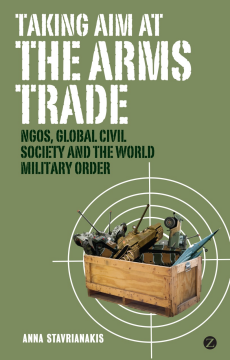
Additional Information
Book Details
Abstract
Taking Aim at The Arms Trade: NGOs, Global Civil Society and the World Military Order takes a critical look at the ways in which NGOs portray the arms trade as a problem of international politics and the strategies they use to effect change.
NGOs have been pivotal in bringing the suffering caused by the arms trade to public attention, documenting its negative impact on human rights, conflict, security and development around the world, and pushing for measures to control or eradicate the trade. Overall, however, their activity has helped sideline debate on Northern military predominance while facilitating intervention in the South based on liberal understandings of the arms trade, conflict, development and human rights. They thus contribute to the perpetuation of a hierarchical world military order and the construction of the South as a site of Northern benevolence and intervention.
Stavrianakis exposes the tensions inherent in NGOs' engagement with the arms trade and argues for a re-examination of dominant assumptions about NGOs as global civil society actors.
'This well-researched, incisive study is essential reading for anyone concerned with the possibilities of change and challenges to military power in our society.'
Martin Shaw, University of Sussex
'Anna Stavrianakis has written a critical account of non-governmental activism that challenges preconceived notions of the progressive and benevolent nature of civil society, and sheds light on the complex inter-relationships between states and NGOs, and between interests and power.'
Keith Krause, Graduate Institute of International and Development Studies in Geneva
'Anna Stavrianakis brilliantly researched book provides an original and critical examination of the relationship between NGOs and the international arms trade.'
Mark Duffield, University of Bristol
'Anna Stavrianakis combines detailed analysis with critical insights in a manner that is both illuminating and stimulating and raises issues that are at the core of civil society. She has written a book that deserves to be read and thought about not just by activists and policy advisers but by anyone in the academic community and, indeed, in politics as a whole, who is concerned with peaceful social change.'
Paul Rogers, Bradford University
Anna Stavrianakis is a Lecturer in International Relations at the University of Sussex. Her main research interests are NGOs and global civil society; the arms trade and military globalisation; and critical approaches to the study of international security.
Table of Contents
| Section Title | Page | Action | Price |
|---|---|---|---|
| About the author | i | ||
| Acknowledgements | viii | ||
| Abbreviations | ix | ||
| Introduction | 1 | ||
| The cast of characters | 4 | ||
| The argument | 8 | ||
| 1 | Conceptualising Global Civil Society | 14 | ||
| Global civil society as a non-state, non-market sphere | 15 | ||
| Global civil society as the locus of progressive values | 19 | ||
| Global civil society? | 23 | ||
| Global civil society as non-violent | 28 | ||
| Conclusion | 31 | ||
| 2 | What’s the Problem? NGOs and the Arms Trade | 33 | ||
| Reformists and transformists | 34 | ||
| Military production and trade in the post-Cold War era | 40 | ||
| Imperial hierarchies in the world military order | 42 | ||
| Post-Cold War arms control | 51 | ||
| Two sides of the same coin: complementarity of imperial practices | 52 | ||
| Assessing NGO arguments | 55 | ||
| Conclusion | 60 | ||
| Note | 61 | ||
| 3 | NGO Strategies and the Disciplining of Global Civil Society | 62 | ||
| Insiders and outsiders: NGO strategies | 63 | ||
| NGO funding | 71 | ||
| Persuasion versus protest: NGO campaigns since the 1990s | 75 | ||
| Cumulative impact versus undermining of more radical voices | 82 | ||
| Arms capital integration into the state | 86 | ||
| Rethinking global civil society: dual networks | 89 | ||
| Conclusion | 91 | ||
| 4 | Arming the North: Transatlantic and European Military Production and Trade | 93 | ||
| Minding the purse strings: the economics of arms exports | 94 | ||
| Intra-Northern military production and trade | 100 | ||
| UK domestic procurement and military posture | 101 | ||
| Asymmetrical UK–US relations | 104 | ||
| European defence collaboration | 108 | ||
| Conclusion | 111 | ||
| 5 | Disciplining the South: Development and Human Rights Concerns in the Arms Trade | 114 | ||
| ‘Genuine defence needs’: the impact of the arms trade on development | 115 | ||
| Human rights, arms trade wrongs | 127 | ||
| Assessing NGO activity | 133 | ||
| Conclusion | 135 | ||
| Note | 135 | ||
| 6 | Disarming the South: Small Arms and Conflict | 136 | ||
| The conflict–security–development nexus | 137 | ||
| NGOs as nodes in strategic complexes of global liberal governance | 146 | ||
| Small arms as an ideological battleground in global civil society | 149 | ||
| Assessing NGO activity | 155 | ||
| Conclusion | 160 | ||
| 7 | NGOs, Global Civil Society and the World Military Order | 163 | ||
| Dual networks | 164 | ||
| Progressive values, liberalism and the normalisation of imperial practices | 167 | ||
| Insiders, outsiders, cumulative impact and social forces | 170 | ||
| Reproducing hierarchy: global civil society and North–South relations | 172 | ||
| Marginalisation of questions of violence | 175 | ||
| Perpetuation of a hierarchical world military order | 176 | ||
| Ramifications for NGO practice | 181 | ||
| Bibliography | 183 | ||
| Index | 208 |
